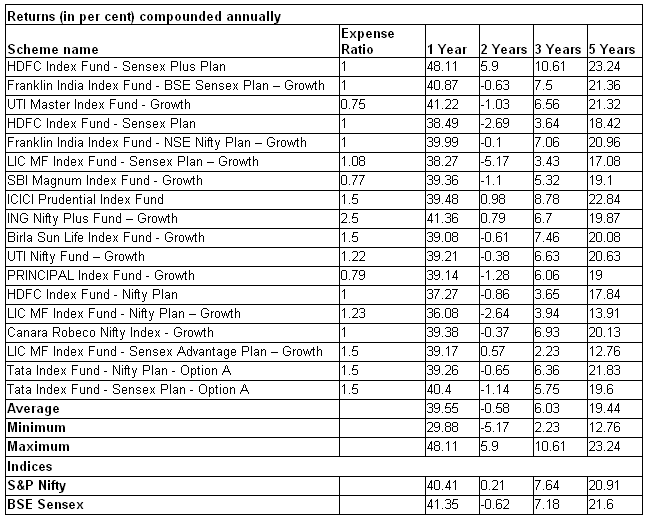A very low-cost index is going to beat a majority of the amateur-managed money or professionally-managed money: Warren Buffet
Does index fund investing apply to Indian investors? Should we take up the option of investing in Index funds?
When you invest in index fund you do not want fund managers to manage your money, but want your returns to mimic those from the benchmark index.
Since buying all 50 stocks that are part of, say, the Nifty 50, is not possible, you invest in an index fund that tracks NSE's Nifty 50. That's the logic!
But are index funds sticking to the mandate given to them or are they outperforming, or worse, underperforming their benchmark?
By definition, index funds track the underlying benchmark index.
They should move in tandem with the benchmark.
That is, if the underlying index gives negative returns over a period of say three years then they should reflect the same. In good times also they should closely track the returns given by their benchmark.
Though index funds are mandated to return almost in-line returns with their respective benchmark indices, often many of them have given returns that are way off the mark.
If you see the return for the past three years you would see a very heavy underperformance or outperformance of the index fund from the index they track.
If your index fund is underperforming its benchmark index by a huge margin, it's bad. But if it outperforms the index, it's not good in the long run either.
Let's look at some of the figures:

Source: AMFI, mutualfundsofindia, bseindia, nseindia
Index funds are mandated to be passively managed. Unlike actively managed funds that decide which stocks to buy, sell, and when to do that, index funds merely invest in all the stocks -- in the same proportion -- as in the benchmark index.
So, even if your index fund occasionally outperforms, it means that the fund manager is going away from the mandate and taking bets with your money.
Sometimes her/his calls will go right and you outperform. At other time the call goes wrong and your fund underperforms. Only one thing is for sure that there would be times when the fund manager would take wrong calls and you will pay for it.
What's the alternative?
With small corpus these funds are always going to find it difficult to manage their fund in such a way that it follows the index they track.
You can opt for exchange-traded funds (ETFs). These are index funds as they, too, invest in a basket of index stocks. However, due to their much more efficient structure, these funds mimic their respective indices as closely as possible, while incurring lower expenses.
The only downside is that ETFs are only available on stock exchanges and you would require a demat account to invest in them. The other drawback is that you cannot start a SIP through them.





